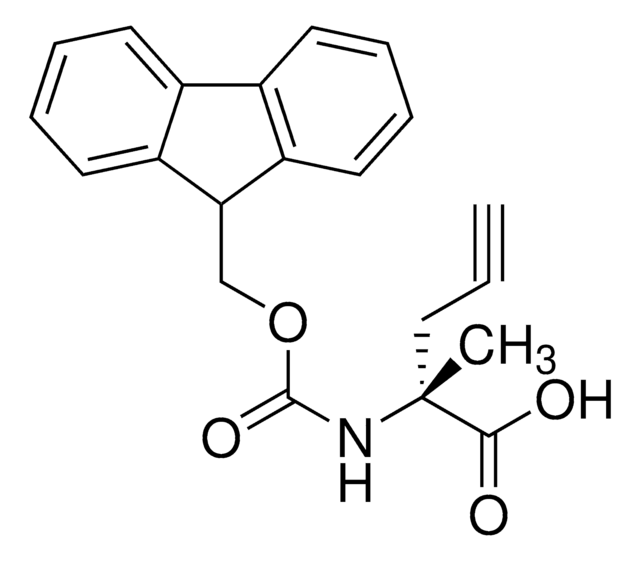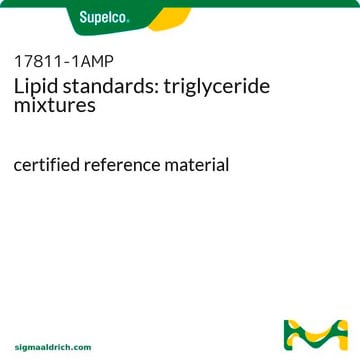추천 제품
Quality Level
양식
solid
사용
40 mL sufficient for 50 reactions
색상
white to off-white
작용기
hydroxyl
관련 질환(들)
obesity
저장 온도
2-8°C
SMILES string
C(C(CO)O)O
InChI
1S/C3H8O3/c4-1-3(6)2-5/h3-6H,1-2H2
InChI key
PEDCQBHIVMGVHV-UHFFFAOYSA-N
일반 설명
The Free Glycerol Reagent provides a precise method for measuring free endogenous glycerol levels through coupled enzyme reactions, bypassing the need for initial lipase hydrolysis. Unlike triglycerides, which are typically bound to proteins and transported in plasma, free glycerol circulates independently. The innovative approach involves enzymatic or alkaline hydrolysis of triglycerides, liberating glycerol and free fatty acids for accurate measurement.
The Serum Triglyceride Determination Kit (Catalog Number TR0100) offers a comprehensive solution for assessing glycerol, true triglycerides, or total triglycerides in serum or plasma samples. Utilizing lipase enzymatic hydrolysis, triglycerides are converted into glycerol and free fatty acids, enabling precise quantification through coupled enzyme reactions by F6428.
Unlike many commercially available triglyceride reagents, this method distinguishes between endogenous glycerol and glycerol derived from lipase hydrolysis of glycerides. With this advanced technology, researchers can confidently analyze glycerol levels with exceptional accuracy and reliability.
The Serum Triglyceride Determination Kit (Catalog Number TR0100) offers a comprehensive solution for assessing glycerol, true triglycerides, or total triglycerides in serum or plasma samples. Utilizing lipase enzymatic hydrolysis, triglycerides are converted into glycerol and free fatty acids, enabling precise quantification through coupled enzyme reactions by F6428.
Unlike many commercially available triglyceride reagents, this method distinguishes between endogenous glycerol and glycerol derived from lipase hydrolysis of glycerides. With this advanced technology, researchers can confidently analyze glycerol levels with exceptional accuracy and reliability.
애플리케이션
The Free Glycerol Reagent facilitates the quantitative enzymatic determination of glycerol levels in serum or plasma. Additionally, it may also be used to measure glycerol release from lipolysis in adipose tissue.
생화학적/생리학적 작용
Glycerol undergoes phosphorylation through the enzymatic action of glycerol kinase (GK), utilizing adenosine-5′-triphosphate (ATP) to produce glycerol-1-phosphate (G-1-P) and adenosine-5′-diphosphate (ADP). Subsequently, glycerol-1-phosphate (G-1-P) is oxidized by glycerol phosphate oxidase (GPO) to yield dihydroxyacetone phosphate (DAP) and hydrogen peroxide (H2O2). This process involves peroxidase (POD), which catalyzes the coupling of hydrogen peroxide (H2O2) with 4-aminoantipyrine (4-AAP) and sodium N-ethyl-N-(3-sulfopropyl) m-anisidine (ESPA) to generate a quinoneimine dye exhibiting an absorbance maximum at 540 nm.The observed increase in absorbance at 540 nm correlates directly with the concentration of free glycerol present in the sample. This method provides a reliable means for quantifying free glycerol levels, enabling accurate assessment of biochemical samples.
특징 및 장점
- Simplified Process: Streamline your workflow with a single reagent, offering a quick 5-minute reaction time.
- User-Friendly Design: Eliminate the need for weighing or mixing multiple reagents, ensuring ease of use and efficiency.
원리
The free glycerol reagent uses coupled enzyme reactions resulting in an increase in absorbance at 540 nm that is directly proportional to the glycerol concentration.
결합
In addition to kits, the individual reagents and glycerol standard are available separately when fewer reactions are needed.
기타 정보
For additional information on our range of Biochemicals, please complete this form.
신호어
Danger
유해 및 위험 성명서
Hazard Classifications
Acute Tox. 4 Oral - Aquatic Acute 1 - Aquatic Chronic 1 - Eye Dam. 1 - Skin Irrit. 2
Storage Class Code
11 - Combustible Solids
WGK
WGK 3
Flash Point (°F)
Not applicable
Flash Point (°C)
Not applicable
개인 보호 장비
dust mask type N95 (US), Eyeshields, Gloves
가장 최신 버전 중 하나를 선택하세요:
시험 성적서(COA)
Lot/Batch Number
Claire Regazzetti et al.
Diabetes, 58(1), 95-103 (2008-11-06)
Obesity is characterized by an overgrowth of adipose tissue that leads to the formation of hypoxic areas within this tissue. We investigated whether this phenomenon could be responsible for insulin resistance by studying the effect of hypoxia on the insulin
Floriana Rotondo et al.
PeerJ, 4, e2725-e2725 (2016-12-06)
White adipose tissue (WAT) is a complex, diffuse, multifunctional organ which contains adipocytes, and a large proportion of fat, but also other cell types, active in defense, regeneration and signalling functions. Studies with adipocytes often require their isolation from WAT
GIP receptor deletion in mice confers resistance to high-fat diet-induced obesity via alterations in energy expenditure and adipose tissue lipid metabolism
Boer GA, et al.
American Journal of Physiology. Endocrinology and Metabolism, 320, E835-E845 (2021)
Geonho Kim et al.
Journal of insect physiology, 106(Pt 1), 13-19 (2017-05-20)
Acetic acid is a fermentation product of many microorganisms, including some that inhabit the food and guts of Drosophila. Here, we investigated the effect of dietary acetic acid on oviposition and larval performance of Drosophila. At all concentrations tested (0.34-3.4%)
Floriana Rotondo et al.
Scientific reports, 7(1), 8983-8983 (2017-08-23)
White adipose tissue (WAT) produces large amounts of lactate and glycerol from glucose. We used mature epididymal adipocytes to analyse the relative importance of glycolytic versus lipogenic glycerol in adipocytes devoid of external stimuli. Cells were incubated (24/48 h) with 7/14 mM
문서
Lipid Induced Insulin Resistance
자사의 과학자팀은 생명 과학, 재료 과학, 화학 합성, 크로마토그래피, 분석 및 기타 많은 영역을 포함한 모든 과학 분야에 경험이 있습니다..
고객지원팀으로 연락바랍니다.






